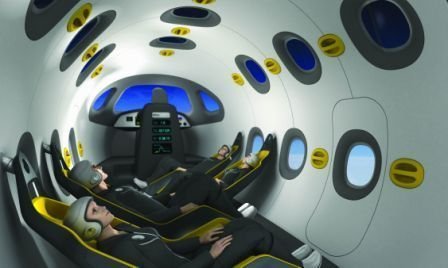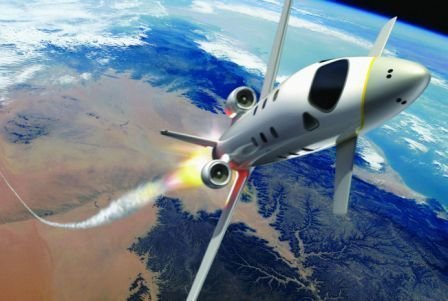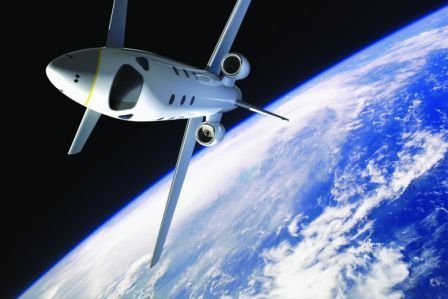EADS has unveiled its concept for a suborbital space tourism vehicle, a sort of EuroSpaceShipTwo.
Here are some excerpts from the press release:
This business jet sized vehicle is designed to carry four passengers 100km up into space giving more than three minutes of "zero G" or weightlessness.
The Astrium space jet will take off and land conventionally from a standard airport using its jet engines. However, once the craft is airborne at an altitude of about 12km, the rocket engines will be ignited to give sufficient acceleration to reach 100km. In only 80 seconds the craft will have climbed to 60km altitude. The rocket propulsion system is then shut down as the ship’s inertia carries it on to over 100km.
The pilot will control the craft using small rocket thrusters enabling passengers to hover weightlessly for 3 minutes. After slowing down during descent, the jet engines are restarted for a normal and safe landing at a standard airfield. The entire trip will last approximately an hour and a half.
Astrium is proposing the one stage system as it is considered the safest and most economical to operate. If development begins in 2008, a first commercial flight would be possible by 2012.
The development of a new vehicle able to operate in altitudes between aircraft (20km) and below satellites (200km) could well be a precursor for rapid transport ‘point-to-point’ vehicles or quick access to space.
Well, at least the pictures look nice...
Here are some excerpts from the press release:
This business jet sized vehicle is designed to carry four passengers 100km up into space giving more than three minutes of "zero G" or weightlessness.
The Astrium space jet will take off and land conventionally from a standard airport using its jet engines. However, once the craft is airborne at an altitude of about 12km, the rocket engines will be ignited to give sufficient acceleration to reach 100km. In only 80 seconds the craft will have climbed to 60km altitude. The rocket propulsion system is then shut down as the ship’s inertia carries it on to over 100km.
The pilot will control the craft using small rocket thrusters enabling passengers to hover weightlessly for 3 minutes. After slowing down during descent, the jet engines are restarted for a normal and safe landing at a standard airfield. The entire trip will last approximately an hour and a half.
Astrium is proposing the one stage system as it is considered the safest and most economical to operate. If development begins in 2008, a first commercial flight would be possible by 2012.
The development of a new vehicle able to operate in altitudes between aircraft (20km) and below satellites (200km) could well be a precursor for rapid transport ‘point-to-point’ vehicles or quick access to space.
Well, at least the pictures look nice...





